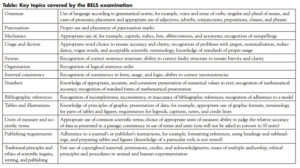Next year, the Board of Editors in the Life Sciences (BELS) will celebrate its 25th anniversary. Founded by a group of CSE (then known as the Council of Biology Editors) members in 1991, the organization was established to evaluate the proficiency of manuscript editors in the life sciences through a certification examination and to award credentials similar to those obtainable in other professions. The BELS examination-based certification program
- Provides qualified manuscript editors in the life sciences a way to demonstrate their editorial proficiency.
- Offers employers and clients of manuscript editors in the life sciences a way to identify proficient editors.
- Establishes a standard of proficiency for editing in the life sciences
The BELS certification examination is a 3-hour multiple-choice test of life-sciences editing in English. Overall, the examination resembles the standard tests used in many professions to certify practitioners. The certification program is designed to provide evidence to employers or clients of editors that a BELS-certified editor has an acceptable level of skill and knowledge relevant to editing in the life sciences. Editors who successfully complete the certification examination may use the designation ELS (Editor in the Life Sciences) after their names to indicate a degree of professional credibility. In fact, editorial job postings regularly received by BELS list the ELS credential as a qualification desired in potential candidates.
More than 150 examination sittings have been administered worldwide, and more than 1,200 editors have earned the ELS credential, including members and leaders of CSE and other allied organizations. An advanced credential of Diplomate Editor in the Life Sciences, ELS(D), is based on portfolio review and has been awarded to 27 editors.
Note that BELS offers certification, not a certificate. Certification indicates a level of mastery or proficiency as demonstrated through an application or examination; it usually confers a credential or designation that can be used after one’s name. In contrast, a certificate simply connotes completion of educational training through courses or workshops. A concise comparison of the distinctions between the two can be found online at www.cfre.org/apply/certificate-vs-certification/.

To qualify for BELS candidacy, applicants must have a bachelor’s degree or equivalent from an accredited academic institution and at least 2 years of experience as a manuscript editor in the life sciences. The application consists of submission of a completed form; a résumé or curriculum vitae; three letters from employers or clients describing and verifying employment; copies of transcripts, diplomas, or other educational documentation; and an application fee of US$50.
The topics covered in the BELS examination are summarized in the Table (see page 64). An online study guide (www.bels.org/becomeeditor/BELSStudyGuide0724121.pdf) reviews the topics, the examination procedure, and recommended resources and references that may be helpful in preparing for the examination. The guide also includes example questions with explanations.
BELS’s sole mission is to certify editors in the life science; thus, BELS does not offer education or training in manuscript editing or in the specific kinds of content that the examination covers. However, a number of sister organizations (including CSE, the American Medical Writers Association, and the European Medical Writers Association) offer educational workshops and certificate programs that may be helpful in preparing to take the BELS examination.
As BELS looks toward its next 25 years, it is strategically focused on strengthening its infrastructure, including the provision of management support to bolster the historically all-volunteer organization. Building BELS’s membership and continuing to strengthen and grow the certification program remain paramount objectives to ensure its continued relevance and recognition in the profession of life-sciences editing.
Thomas Gegeny was BELS President, 2015−2017
